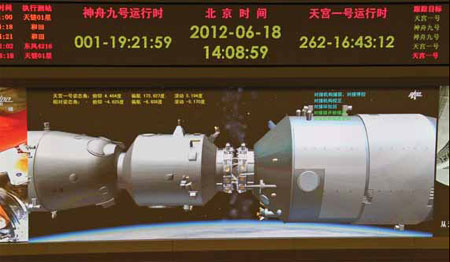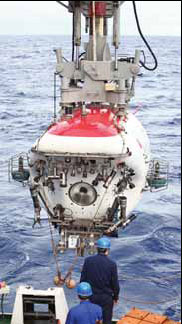Above and below, Chinese science soars
Updated: 2012-06-22 15:47
By Zhao Yanrong (China Daily)
|
||||||||
|
The big screen at the Beijing Aerospace Control Center shows the docking of Tiangong-1 and Shenzhou IX on June 18. Zha chunming / Xinhua |
|
China's deep sea submersible Jiaolong descended to a new depth of 6,965 meters in an 11-hour dive in the Mariana Trench on June 19. Luo Sha / Xinhua |
Huge industrial and commercial benefits seen in space and deep-sea programs
China has just expanded its horizons, high in the sky and deep in the sea, with two scientific achievements. The country's submersible Jiaolong traveled to a record depth of 6,965 meters on June 19 and its fourth manned spacecraft, Shenzhou IX, was launched on June 16 to pave the way for a future space station.
Those scientific feats will help the country promote economic and industrial development and create more opportunities for international cooperation that will benefit the world, scientists and experts say.
"The advanced technologies in China's big projects such as Shenzhou IX and Jiaolong will bring the Chinese economy to a new level with unlimited economies of scale, and make it much more capable of contributing to world peace and global economic development," says Du Hui, a professor at the People's Liberation Army Naval Academy in Dalian.
Deep-diving technology development, especially for the development of deep-sea resources, is of great significance, he says. There are many deep-sea mineral resources that have immense scientific and economic value, and a treasure trove of research for marine scientists worldwide, Du says.
"Jiaolong descended nearly 7 kilometers, so China's manned deep-submergence technologies are capable of undertaking activity over nearly 99.8 percent of the world's oceans, which means reaching much richer oil and gas resources more cheaply."
China is the world's second-largest oil consumer, importing 253.78 million metric tons, at a cost of about $196.66 billion (155.05 billion euros) last year. That volume was 6 percent more than the year before, and the price rose 45.3 percent year-on-year, the General Administration of Customs reported in January.
Du says more than 70 percent of the world's oil and gas is obtained in the ocean, and about 1 trillion barrels of oil reserves can be found in deep waters.
Offshore oil resources will be an important source of crude oil production growth in the future, and more than half of global oil and gas production and reserves will come from the ocean.
"The economic impact will be significant," he says.
"Many technological breakthroughs in Jiaolong can also be adopted by civilian deep-submergence programs. A few related industries, such as shipbuilding and supporting equipment industries, will also get a fillip from advanced technologies and the development of China's deep-submergence programs."
Developed countries such as the United States and Britain have led the world in deep-sea exploration for decades, but China's technologies are close to the most advanced.
"Multinational collaboration in deep-sea exploration is common," Du says. "With this successful dive China will get the chance to cooperate with other countries to carry out more offshore projects."
China's feats in space are also likely to have economic spin-offs. Shenzhou IX has reached the latest major milestone on China's way toward building a permanent space station by the end of the decade.
At the forefront of the space achievements have been the country's first female astronaut, Liu Yang, and the successful completion of the space rendezvous and docking with the Tiangong-1 module now orbiting Earth. All these have lit a fuse that will ignite huge business potential.
"Space development requires huge investment, but the projects also come out with high returns," says Yang Yuguan of China Aerospace Science and Industry Corp.
"China's investment in the space is far behind that of the US and Russia."
Every dollar invested in space will eventually bring a six-fold return, Yang says. Some international experts say the return on investment can even double that.
In November Chinese media quoted Zhou Jianping, chief engineer of the manned space program, as saying NASA had a budget of about $18 billion each year since 2009, while China had spent a lot less, about 35 billion yuan ($5.5 billion; 4.3 billion euros), over the past 20 years, on its manned space program.
Following the rendezvous between Shenzhou IX and the Tiangong-1 module the three astronauts are due to stay in space for 13 days. Tests and experiments they do will be in preparation for China's building a space station in the near future.
"A space station has a significant economic impact," Yang says. "For example, with it Chinese will be able to explore rare resources in the asteroid belt, and carry out sophisticated laboratory experiments.
"Investment in space programs also invigorates many related industrial chains such as the radar industry and the materials industry."
The vast range of equipment needed to build and launch the Shenzhou spacecraft would spur development in China's basic equipment industries, Yang says.
"Our satellite telecommunications and satellite navigation will also be improved through manned spaceflight systems, which will better be able to service our automobile industries in the future."
Zhang Yuhan, a scientist with the Center for Space Science and Applied Research at the Chinese Academy of Sciences, says everything the astronauts on Shenzhou are using has been developed by Chinese scientists, including their clothing, food, fitness equipment and other daily necessities.
"Our technologies may still be behind those of the US and Russia, but what we make is attractive to many countries. We are capable of helping them with space transport and scientific experiments."
Seventeen life-science experiments were conducted in space on the unmanned Shenzhou VIII last year.
In building space laboratories and space stations, China will continue with international exchanges based on mutual respect, mutual gain, transparency and opening-up, Xinhua News Agency quoted Wu Ping, spokeswoman for China's manned space program, as saying.
China is the third country to set up a program for selecting and training astronauts, after the US and Russia, Xinhua said, and the country will offer such training to other countries, especially developing nations.
zhaoyanrong@chinadaily.com.cn
(China Daily 06/22/2012 page3)

 Relief reaches isolated village
Relief reaches isolated village
 Rainfall poses new threats to quake-hit region
Rainfall poses new threats to quake-hit region
 Funerals begin for Boston bombing victims
Funerals begin for Boston bombing victims
 Quake takeaway from China's Air Force
Quake takeaway from China's Air Force
 Obama celebrates young inventors at science fair
Obama celebrates young inventors at science fair
 Earth Day marked around the world
Earth Day marked around the world
 Volunteer team helping students find sense of normalcy
Volunteer team helping students find sense of normalcy
 Ethnic groups quick to join rescue efforts
Ethnic groups quick to join rescue efforts
Most Viewed
Editor's Picks

|

|

|

|

|

|
Today's Top News
Chinese fleet drives out Japan's boats from Diaoyu
Health new priority for quake zone
Inspired by Guan, more Chinese pick up golf
Russia criticizes US reports on human rights
China, ROK criticize visits to shrine
Sino-US shared interests emphasized
China 'aims to share its dream with world'
Chinese president appoints 5 new ambassadors
US Weekly

|

|








